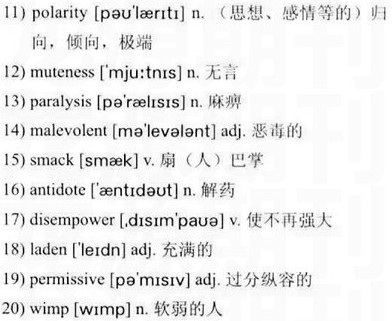文字难度:★★★
A five-month-old baby is lying in his mother’s arms. He is close to sleep, then wakes and begins to cry. His mother tells him that he should stop being a naughty boy, and that she will be 1)cross with him if he doesn’t sleep.
一个五个月大的宝宝正躺在妈妈的臂弯里。他昏昏欲睡,却突然惊醒,放声大哭。他妈妈对他说,别淘气了,再不睡觉,她就生气了。
An 18-month-old child is taken to a restaurant with her father and uncle. Her father goes to the bar, leaving the child with the uncle at the table. The child gets down from the table to follow her father. She is grabbed by her uncle and told that she is a bad child, and to stay in her chair. She looks around worriedly for her father.
一个18个月大的孩子跟随爸爸和叔叔去一家餐馆。她爸爸留下她和叔叔坐在餐桌前,自己走去吧台。孩子从椅子上下来要跟爸爸一起去。她叔叔却一把拉住她,说她真是一个坏孩子,命令她坐回到自己的椅子上。她焦虑不安地四处张望寻找她爸爸。
 At an adult’s birthday party, a six-year-old is awake long past his bedtime. He is running around the hall with the 2)helium-filled balloons. His father yells at him to leave the balloons alone, and tells him to stop being a trouble-maker.
At an adult’s birthday party, a six-year-old is awake long past his bedtime. He is running around the hall with the 2)helium-filled balloons. His father yells at him to leave the balloons alone, and tells him to stop being a trouble-maker.
在一个大人的生日派对上,一个六岁的孩子还没睡觉,而当时已经比他平时上床睡觉的时间晚很多了。他拉着氦气球在大厅里跑来跑去。他爸爸向他大声叫喊,要他别碰那些气球,别调皮捣蛋。
What did these children learn from these experiences? Many would say that the adults’ responses were necessary to teach the child the difference between right and wrong: between “good” and “bad” behavior. Shaming is one of the most common methods used to regulate children’s behavior. But what if shaming our children is harming our children?
从这些事件中,孩子们学到了什么呢?可能很多人会说家长的回应必须让孩子懂得分辨对与错——行为的“好”与“坏”。让孩子感到羞愧是规范孩子行为的最常用方法之一。但是如果说这样做反而会伤害到我们的孩子呢?
Actually, shaming acts as a 3)pressure valve to relieve parental frustration. Shaming is an anger-release for the parent; it makes the shamer feel better—if only 4)momentarily.
实际上,让孩子感到羞愧的做法是家长释放挫折感的一种发泄方式。这种行为是家长对愤怒的一种宣泄;这可以使羞辱者觉得舒畅——即使只是暂时性的。
When made to feel unworthy, children often work extra hard to please their parents. This makes the parent think that the shaming has “worked”. But has it?
当孩子被羞辱,觉得自己很差劲的时候,他们通常会更加努力去取悦父母。这让父母觉得羞辱这一招很“奏效”。但事实上是这样吗?
Well-meaning adults can sometimes underestimate children’s sensitivity to shaming language. There is mounting evidence that some of the words used to scold children—household words previously thought “harmless”—have the power to 5)puncture children’s self-esteem for years to come.
有时候,大人责骂本是一番好意,但可能低估了孩子对羞辱词语的敏感程度。越来越多的证据表明,一些常用来斥责孩子的词语——以前被认为“毫无杀伤力”的常用骂词——会对孩子的自尊心产生长久的伤害。
A child’s self-identity is shaped around the things they hear about themselves. A ten-year-old girl, for example, was overcome with anxiety after spilling a drink. She exclaimed over and over: “I’m so stupid! I’m so stupid!” These were the exact words her mother had used against her. She lived in fear of her parents’ judgment, and learned to shame herself in the same way that she had been shamed.
孩子自我认识的形成,离不开从别人那里听到对自己的评价。例如,一个十岁的小女孩在弄洒了饮料之后,变得非常焦虑不安。她不停地喊道:“我真笨!我真笨!”这正是她妈妈对她说过的话。她总是担忧父母对她的评价,并且学会使用像她曾被羞辱的方式来羞辱自己。
If children’s emotional needs are dismissed, if their experiences are 6)trivialized, they grow up feeling unimportant. If they are told that they are “bad” and “naughty”, they absorb this message and take this belief into adulthood.
如果孩子的情绪被压抑,如果他们的个人体验被忽视和淡化,他们长大后会认为自己渺小卑微。如果别人说他们是“坏孩子”、“捣蛋鬼”,他们就会接收这个信息,直至成年也对此深信不疑。
Shame makes people feel diminished. It is the fear of being exposed and can lead to 7)withdrawal from relationships. Shaming creates a feeling of powerlessness to act and to express oneself: We want to dance, but we’re stopped by memories of being told not to be “so childish”. We seek pleasure, but we’re 8)inhibited by inner voices telling us we are “9)self-indulgent” or “lazy”. We strive to excel, or to speak out, but we’re held back by a suspicion that we are not good enough. Shame 10)takes the shape of the inner voices and images that mimic those who told us, “Don’t be stupid,” or “Don’t be silly!”
羞耻感使人贬低自我。这是一种对表露自我的恐惧,并导致个人从各种人际关系中退缩。羞耻感使人对某些事情感到无能为力,并且无法表达自己:我们想跳舞,但是记起以前别人劝说自己别“那么幼稚”,于是没有去跳。我们寻找乐趣,却被内心的声音阻止,这个声音说我们太“放纵自己”了,或者太“懒惰”了。我们努力试着做得比别人更好,或者说出自己的想法,但是我们担心自己做得还不够好,于是压制自己的做法和想法。羞耻感以内心声音和形象的方式出现,模仿那些曾经劝阻我们的旁人说“别蠢了”或者“别天真了”。
Thomas Scheff, a University of California sociologist, has said that shame inhibits the expression of all emotions—with the occasional exception of anger. People who feel shamed tend toward two11)polarities of expression: emotional 12)muteness and 13)paralysis, or bouts of hostility and rage. Some swing from one to the other.
加州大学的社会学家托马斯·雪芙曾说过,羞耻感会抑制个人表达各种情绪——愤怒这种情绪是少有的例外。感到羞耻的人倾向于走两个极端:要不感情冷漠和麻木不仁,要不燃起一次又一次的敌意和愤怒。有些人甚至从一个极端走向另一个极端。
Recent research tells us that shame motivates people to withdraw from relationships, and to become isolated. Moreover, the shamed tend to feel humiliated and disapproved of by others, which can lead to hostility, even fury. When angry, shamed individuals are more likely to be 14)malevolent, indirectly aggressive or self-destructive.
最近的研究显示,羞耻感促使个人在人际关系中退缩,把自己孤立起来;更严重时,还会让人觉得丢脸,以为不被别人所接受,由此可以衍生出敌意,甚至怒火。当生气时,羞愧的人更可能产生恶意,消极对抗情绪,或者出现自毁倾向。
Many people are still convinced that 15)smacking or shaming is the only 16)antidote for preventing antisocial behaviors in children. The suggestion of giving up shaming or smacking is misinterpreted by some as an attempt to 17)disempower parents, to turn them into guilt-18)laden, ineffectual and 19)permissive 20)wimps. Not so. Effective and healthy boundaries can be set without resorting to violence or shaming. Being strong with children does not mean being harsh or humiliating.
许多人仍然深信,以暴制暴或者羞辱是制止孩子反社会行为的唯一良方。放弃使用以暴制暴或者羞辱手段的建议被一些人误认为要削弱家长的权威;让家长变成内疚满满,软弱无能,过分纵容的懦夫。事实上并非如此。有效健康的行为规范可以用暴力或羞辱以外的方式来建立。对孩子严加管教并不等于苛刻对待孩子或对其进行羞辱。
There are alternatives to shaming that are healthier and more effective. Children who are shown consistent boundaries by parents who are able to express their feelings and needs in a trusting and respectful way, grow up with stronger self-worth and social awareness, free of the toxic effects of shame.
比羞辱更健康和有效的教育方法有不少。如果家长能以信服和尊重的方式来表达他们的感受和需要,对孩子的行为界限提出适当的要求,那么这些孩子长大以后的自我价值和社会意识会更强,且不受羞耻感教育的遗害。



